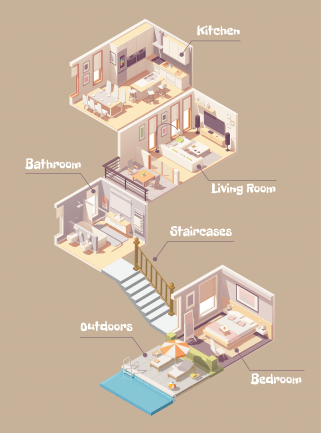The Burrow

For many of us, our home is our sanctuary. It’s the last place you expect to find yourself the victim of an accident or injury.
Yet every year, people fall victim to all sorts of mishaps around the home, resulting in damage, injuries and, tragically, even death. For instance, in the US alone, more than 26 million people sought medical help in 2019 for injuries sustained at home.1
But what causes these accidents around the home? Let’s have a look through various statistics to see whether some common features found in our homes could pose a bigger danger than we perhaps realise.

Many accidents and injuries around the home are potentially preventable if you take the right precautions and follow safety measures. Here are a few home safety tips to help you on your way.

To avoid fires in the kitchen, make sure you never leave your cooking unattended, and turn off the hot plate when you leave the room.13 Keep your cooking area clear of flammable items (like curtains and tea towels) and do not use water on a fat or oil fire; smother these stove-top fires with the pan lid or a fire blanket and turn the hot plate off.
Fires in bedrooms can be caused by faulty electrical appliances, like electric blankets and fans. Always use your electric blanket per the instructions, turn it off before you go to sleep or leave the house, and never use it on a water bed.14 Don’t run extension cords for other electrical appliances under carpets or rugs, and replace any frayed or breaking cables.
Heating equipment (including appliances and fireplaces) can cause fires in living rooms if you’re not careful. Keep flammable materials like clothes and paper at least three feet (one metre) away from the heater and turn off portable heaters before going to bed or leaving your home.15
You should have a fire escape plan for your home and practise it as well.16 Identify ways to get out of each room if the primary path is blocked, and check that your windows aren’t stuck and can be properly opened.
For smoke alarms, make sure to have one on every level of your house (including basements) and replace the batteries whenever necessary;16 the New South Wales Rural Fire Service in Australia recommends changing the battery at least once every 12 months.17 Don’t turn the alarms off while cooking, either!

You can reduce your risk of falls around the home through several means. Fix trip hazards (such as slippery flooring, loose rugs and frayed carpets) and make sure your home has good lighting.18 Get a non-slip mat for your bathroom and consider outfitting your stairs and bathroom with handrails. If you can, make sure your bed and chairs are at a height you can easily get up from.
Gardening injuries can be avoided by taking simple safety precautions. When gardening out in the sun, wear long-sleeved clothing, a hat, sunglasses and sunscreen.19 You should also wear enclosed shoes, eye protection and long pants when mowing. Regularly check and clean your gardening equipment.
To prevent drowning, install a fence around the entire pool to separate it from the rest of the house and yard, with a gate that’s self-closing and self-latching.20 You should always watch children while they’re in the water, so avoid things like using your phone or reading a book.
Burns and scalds are a big risk in the kitchen, particularly for children. Make sure to turn the handles of pots and pans away from the front of the stove (point them towards the back instead) and keep hot drinks away from surface edges.21 Take your plate to the pot to serve, not the other way around, and avoid carrying hot drinks when children are near or when you’re holding them.